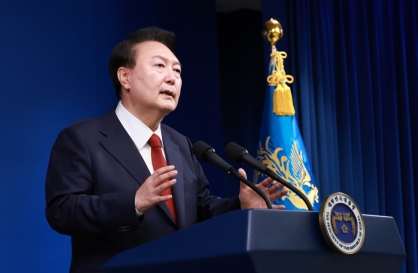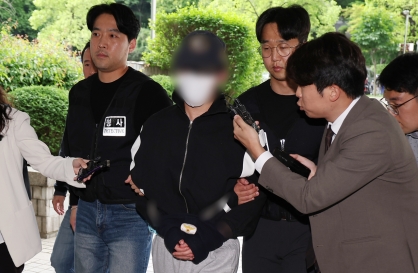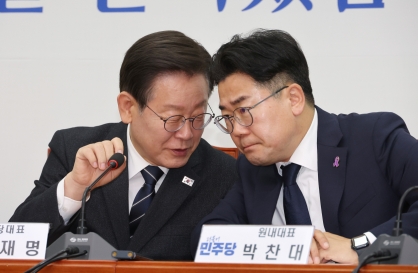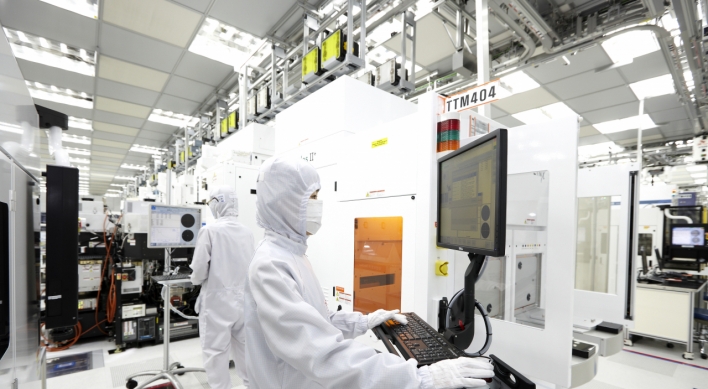Chung Mong-joon joins ruling party’s nomination race
By Korea HeraldPublished : April 29, 2012 - 19:12
Billionaire and veteran politician Chung Mong-joon officially announced his bid to win the ruling Saenuri Party’s presidential nomination.
This will be 60-year-old Chung’s second try at the presidency since 2002.
“I will write a new history of the Republic of Korea by facilitating my experience of managing a business, engaging in diplomacy and creating unity in the nation,” Chung said at a press conference at the National Assembly.
The six-term lawmaker became the second Saenuri member to enter the nomination race following Gyeonggi Gov. Kim Moon-soo, who declared his candidacy on April 22. Both face an uphill battle against frontrunner Park Geun-hye.
Chung, well known for his buoyant style, stressed the country was suffering from social polarization, youth unemployment and irregular jobs, aggravated by sweet-talking politicians who fail to give solutions.
“What is important is (to achieve) political reform,” Chung said, contending he will do away with regionalism and factional politics. Chung will serve his seventh term at the 19th National Assembly upon winning in Dongjak-gu, Seoul, in the April 11 general elections.
This will be 60-year-old Chung’s second try at the presidency since 2002.
“I will write a new history of the Republic of Korea by facilitating my experience of managing a business, engaging in diplomacy and creating unity in the nation,” Chung said at a press conference at the National Assembly.
The six-term lawmaker became the second Saenuri member to enter the nomination race following Gyeonggi Gov. Kim Moon-soo, who declared his candidacy on April 22. Both face an uphill battle against frontrunner Park Geun-hye.
Chung, well known for his buoyant style, stressed the country was suffering from social polarization, youth unemployment and irregular jobs, aggravated by sweet-talking politicians who fail to give solutions.
“What is important is (to achieve) political reform,” Chung said, contending he will do away with regionalism and factional politics. Chung will serve his seventh term at the 19th National Assembly upon winning in Dongjak-gu, Seoul, in the April 11 general elections.

The party is facing widening controversy over the party’s presidential nomination rule. Park, its chairwoman, supports the current system where 80 percent of the vote goes to the party members and citizens recruited by the party. The reform-minded faction, on the other hand, demand that the party introduce an open primary fully decided by citizens regardless of party affiliation. Chung sided with the proposed nomination rule change, also demanded by Kim Moon-soo.
Another potential competitor within the ruling party is veteran party member Lee Jae-oh, who has been maintaining uneasy relations with chairwoman Park as he leads a faction loyal to President Lee Myung-bak.
Former Incheon Mayor Ahn Sang-soo also plans to announce on May 6 that he will join the nomination contest.
The race among the potential presidential candidates is likely to intensify when the Saenuri Party elects its new leadership on May 15.
Chung, the sixth son to late Hyundai founder Chung Ju-young, has not been shy about his ambition to become president, even after the 2002 debacle when he rescinded his candidacy and supported then-rival late President Roh Moo-hyun, only to withdraw his support a day before the election day. Chung’s abrupt change-of-heart is said to have boosted the vote for Roh, who beat political heavyweight Lee Hoi-chang by a margin of two percentage points to become the 16th president.
Lately, Chung’s intention to run for president became evident when his think tank, the Asan Institute for Policy Studies, hosted a series of extravagant security-related seminars and forums inviting world-renowned scholars and experts over the past couple of years. Chung is currently an honorary chairman of the board of directors of the organization.
The institute, initially led by Chung’s mentor and former Foreign Minister Han Seung-joo, is widely perceived as Chung’s footing to broaden his political influence.
Establishing a think tank is considered one key strategy by politicians to promote their political aspirations. President Lee gathered his political supporters by running a research institute since 1994. The Institute for the Nation’s Future, a purported think tank for Park Geun-hye, was mobilized in 2010.
Chung entered politics by running as an independent in 1988 for the constituency of Ulsan, where Hyundai Heavy Industries is located. Chung is the largest shareholder of the shipbuilding giant.
Chung joined a party briefly created in 1992 by his late father upon the senior Chung’s attempt at presidency.
After returning as an independent lawmaker, Chung focused his career in sports diplomacy, heading the Korea Football Association since 1993. He played a major role in hosting the 2002 World Cup, and is currently an honorary vice president of Federation Internationale de Football Association.
Riding on the World Cup fever in 2002, Chung launched his National United 21 party and ran in the presidential race. He then allied with progressive candidate Roh less than a month before the presidential election. Chung, however, abruptly withdrew his support a day before the election day, citing Roh’s inter-Korean policies as contradicting to his beliefs. There were wide speculations, however, that Chung’s change-of-heart was caused by Roh’s campaign stump that shunned Chung as a potential successor in the next presidency.
Chung continued as an independent lawmaker until 2007, when he openly supported then-candidate Lee Myung-bak, and joined the Grand National Party, a precursor to Saenuri.
He left his dedicated constituency Ulsan in the 2008 general elections upon the party’s request and ran successfully in Dongjak-gu, Seoul.
He became the GNP’s chairman in 2009 but resigned in 2010 upon June 2 regional election defeat.
Most recently in 2011, Chung invested 200 billion won worth of private fortune to help launch the Asan Nanum Foundation, an organization founded in commemoration of the 10th anniversary of Hyundai Founder Chung’s passing to promote welfare and support young entrepreneurs.
By Lee Joo-hee (jhl@heraldcorp.com)
-
Articles by Korea Herald









![[K-pop’s dilemma] Time, profit pressures work against originality](http://res.heraldm.com/phpwas/restmb_idxmake.php?idx=644&simg=/content/image/2024/05/08/20240508050705_0.jpg&u=20240508171126)









![[Today’s K-pop] Stray Kids to drop new album in July: report](http://res.heraldm.com/phpwas/restmb_idxmake.php?idx=642&simg=/content/image/2024/05/09/20240509050659_0.jpg&u=)